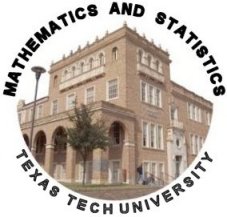Workshops for Students
Music is math. Sounds good?
Dr. Giorgio Bornia
Music is the place where sounds meet feelings.
We play music because we feel.
We listen to music because we feel.
And guess what? Mathematics - apparently such a cold discipline - takes part in this emotional process.
We will explore the world of music through mathematics.
In this journey, a good old companion will lead us: the guitar.
Parallel lines never meet, or do they?
Dr. Lars Christensen
We learn in geometry
class that parallel lines never meet, but every time we let our eyes follow a straight stretch of
highway all the way to the horizon, we doubt it. Of course mathematics has a way to make sense
of what we see. In projective geometry, two parallel lines do meet in a point infinitely far away!
And, actually, a line and a parabola always have two intersection points, provided that one looks
carefully and counts properly.
Classifying wallpaper patterns
Dr. Lance Drager
We will present the idea of Euclidean motions in the plane and groups of motions.
We will list the 17 classes of wallpaper patterns, and practice classifying some
example of wallpaper patterns, including some Escher drawings.
Next Up!
Dr. Raegan Higgins
This will be a hands-on introduction to difference
equations. We will introduce a variety of basic sequences and see how to establish recursive
relationships.
Can Math Help Prevent the Spread of Infectious Diseases?
Dr. Angela Peace
When the next epidemic breaks out, how do we prevent it from spreading around the world? In
this workshop we will learn how mathematics can be used to study the spread of infectious
diseases. We will use mathematical models to find out how rapidly they can be expected to spread,
how many people will be affected, and also what proportion of a population should be vaccinated,
if a vaccine exists.
Carthage, Oxhide, and Mathematics
Dr. Hung Tran
We talk about the legendary
foundation of Carthage by Queen Dido, based on a piece of oxhide and some clever mathematics.
It is an example of a broader theme of optimization problems which have several practical
applications. There will be soap bubbles, architecture, and fun.
Data Science: from Earth to the Universe
Dr. Dimitri Volchenkov
In this workshop,
we are going to present some research projects performed by graduate students from different
departments. The topics will include different aspects and methods of Data Analysis. Applications
will include classifications of international cuisines, computer games, spectra of stars, classical
literature texts, etc. The graduate students will give brief presentations of their results
How fast can you react?
Dr. Min Wang
During the workshop, we will find several
student volunteers to collect their reaction time data using online tools and then present the basic
idea of statistics to how to display and analyze the data and make comparisons among different
data sets. This activity will help students gain some insights about applications of statistics in daily
life.
Project Lazarus
Dr. Brock Williams
This session will be a hands-on introduction to
LAZARUS, the Lab for the Analysis of Zombie Activity and Research into Undead Simulations.
We'll discuss the math we use to model zombie outbreaks. We'll visit the lab's GPU cluster so you
can see how a supercomputer is constructed. Finally, we'll describe the outreach mission of the lab
and do some hands-on experimentation with our web resources.
|

